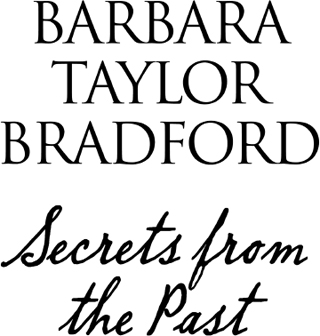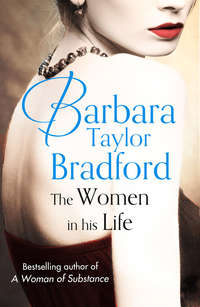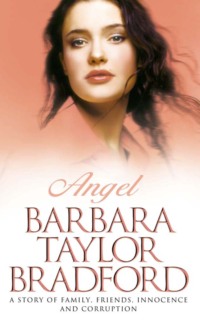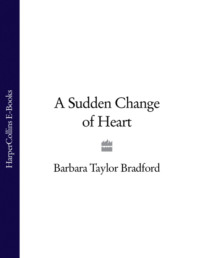
Полная версия
Secrets from the Past



Copyright
Published by HarperCollinsPublishers Ltd 1 London Bridge Street London SE1 9GF
www.harpercollins.co.uk
Published by HarperCollinsPublishers 2013
Copyright © Barbara Taylor Bradford 2013
Barbara Taylor Bradford asserts the moral right to be identified as the author of this work
A catalogue record for this book is available from the British Library
Source ISBN: 9780007304165
Ebook Edition ISBN: 9780007304288
Version: 2017-10-25
This novel is entirely a work of fiction. The names, characters and incidents portrayed in it are the work of the author’s imagination. Any resemblance to actual persons, living or dead, events or localities is entirely coincidental.
All rights reserved under International and Pan-American Copyright Conventions. By payment of the required fees, you have been granted the non-exclusive, non-transferable right to access and read the text of this e-book on screen. No part of this text may be reproduced, transmitted, down-loaded, decompiled, reverse engineered, or stored in or introduced into any information storage and retrieval system, in any form or by any means, whether electronic or mechanical, now known or hereinafter invented, without the express written permission of HarperCollins.
For Bob, with all my love
Table of Contents
Title Page
Copyright
Dedication
Part One: Snapshot Memories: Manhattan, March 2011
Chapter One
Chapter Two
Chapter Three
Chapter Four
Chapter Five
Chapter Six
Chapter Seven
Part Two: Personal Close-Ups: Venice, April
Chapter Eight
Chapter Nine
Chapter Ten
Chapter Eleven
Chapter Twelve
Chapter Thirteen
Chapter Fourteen
Chapter Fifteen
Chapter Sixteen
Chapter Seventeen
Part Three: Revealing Angles: Nice, April
Chapter Eighteen
Chapter Nineteen
Chapter Twenty
Chapter Twenty-One
Chapter Twenty-Two
Chapter Twenty-Three
Chapter Twenty-Four
Chapter Twenty-Five
Chapter Twenty-Six
Chapter Twenty-Seven
Chapter Twenty-Eight
Part Four: A Single Frame Tells It All: Nice/New York, May/June
Chapter Twenty-Nine
Chapter Thirty
Chapter Thirty-One
Chapter Thirty-Two
Chapter Thirty-Three
Chapter Thirty-Four
Chapter Thirty-Five
Part Five: Candid Images: Libya, July/August
Chapter Thirty-Six
Chapter Thirty-Seven
Chapter Thirty-Eight
Chapter Thirty-Nine
Chapter Forty
Chapter Forty-One
Chapter Forty-Two
Part Six: Out of Film: Venice, August 2011
Chapter Forty-Three
Chapter Forty-Four
Chapter Forty-Five
Chapter Forty-Six
Epilogue: Nice, October 2011
Epilogue
Acknowledgements
Author’s Note
Keep Reading
Books by Barbara Taylor Bradford
About the Publisher
PART ONE
Snapshot Memories: Manhattan, March 2011
In my own very self, I am part of my family.
D. H. Lawrence, Apocalypse
Memories of love abound,
In my heart and in my mind.
They give me comfort, keep me sane,
And lift my spirits up again.
Anonymous
ONE
It was a beautiful day. The sky was a huge arc of delphinium blue, cloudless, and shimmering with bright sunlight above the soaring skyline of Manhattan. The city where I had lived, off and on, for most of my life, was looking its best on this cold Saturday morning.
As I walked up Sutton Place, returning to my apartment, I began to shiver. Gusts of strong wind were blowing off the East River, and I was glad I was wearing jeans instead of a skirt, and warm clothes. Still shivering, I turned up the collar of my navy-blue pea jacket and wrapped my cashmere scarf tighter around my neck.
It was unusually chilly for March. On the other hand, I was enjoying my walk after being holed up for four days endeavouring to finish a difficult chapter.
Although I was a photojournalist and photographer by profession, I’d recently decided to write a book, my first. Having hit a difficult part earlier this week, I’d been worrying it to death for days, like a dog with a bone. Finally I’d got it right last night. It felt good to get out, to stretch my legs, to look around me and to remind myself that there was a big wide world out here.
I increased my pace. Despite the sun, the wind was bitter. The weather seemed to be growing icier by the minute, and I hurried faster, almost running, needing to get home to the warmth.
My apartment was on the corner of Sutton and East Fifty-Seventh, and I was relieved when it came into view. Once the traffic light changed, I dashed across the street and into my building, exclaiming to the doorman, as I sped past him, ‘It’s Arctic weather, Sam.’
‘It is, Miss Stone. You’re better off staying inside today.’
I nodded, smiled, headed for the elevator. Once inside my apartment I hung up my scarf and pea jacket in the hall cupboard, went into the kitchen, put the kettle on for tea and headed for my office.
I glanced at the answering machine on my desk and saw that I had two messages. I sat down, pressed play and listened.
The first was from my older sister Cara, who was calling from Nice. ‘Hi, Serena, it’s me. I’ve found another box of photographs, mostly of Mom. Looking fab. You might want to use a few in the book. Shall I send by FedEx? Or what? I’m heading out now, so leave a message. Or call me tomorrow. Big kiss.’
The second message was from my godfather. ‘It’s Harry. Just confirming Monday night, Serena honey. Seven thirty. Usual place. Don’t bother to call back. See ya.’
The whistling kettle brought me to my feet. As I made the tea I felt a frisson of apprehension, then an odd sense of foreboding … something bad was going to happen, I felt it in my bones.
I pushed this dark feeling away, carried the mug of tea back to my office, telling myself that I usually experienced premonitions only when I was at the front, when I sensed imminent danger, knew I had to run for my life before I was blown to smithereens by a bomb, or took a bullet. To have such feelings now was irrational. I shook my head, chiding myself for being overly imaginative. But in fact I was to remember this moment later and wonder if I’d had some sort of sixth sense.
TWO
The room I used as an office was once my mother’s den, years ago. It was light, airy, with large plate-glass windows at one end. She had decorated it in cream and deep peach with a touch of raspberry; I had kept those colours because they emphasized its spaciousness and I found them restful.
In fact I had pretty much left the room as it was, except for buying a modern desk chair. I loved her antique Georgian desk, the long wall of bookshelves that held her various decorative objects and family photographs as well as books.
At the windowed end of the room my mother had created a charming seating area with a big comfortable sofa, several armchairs and a coffee table. I headed there now, carrying my mug. I sat down on the sofa, sipped the tea, and, as always, marvelled at the panoramic view spread out before me: the East River, the suspension bridges and the amazing skyscrapers that helped to make this city so unique.
The windows faced downtown, and just to my right was the elegant Art Deco spire of the Chrysler Building and next to it the equally impressive Empire State. The city had never looked better, had made an unusually spectacular comeback after the bombing of the World Trade Center in 2001.
I realized, with a small jolt of surprise, that it was ten years ago already. The anniversary of that horrific attack would be this coming September, since we were now in the year 2011.
What mattered, though, was that One World, the new tower, was already on its way up, would keep on going up and up and up, until it reached 1,776 feet, that well-known number not only commemorating Independence Day, but also making it the highest building in the Western hemisphere.
That particular September remained vivid in my mind, not only because of the heinous crime that had been committed, but because we had all been here together as a family. In this very apartment, which my mother had bought thirty years ago now, in around 1980, just before I was born.
My mother, who had an amazing eye for art and architecture, had a predilection for buying apartments and houses, which is why my sisters and I had grown up all over the world: New York, London, Paris, Nice and Bel Air. My grandmother used to say we were like gypsies with money.
My father, who loved to tease my mother about anything and everything, would point out how proud he was of himself, because he had never felt the need to indulge himself in this way, had never invested money in bricks and mortar, and never would.
My mother’s pithy answer was always the same. She would point out that despite this, he managed somehow to commandeer most of the closets in their different homes, in which he would then hang his extensive collection of beautiful, very expensive clothes. This was true, and they would laugh about it, as always enjoying being together, loving each other, the best of friends.
Suddenly, I saw them in my mind’s eye. They were true blue, those two. True to each other and to us, to me and my twin sisters Cara and Jessica, who were eight years older than me and who used to boss me around, albeit in a genial way. My father called us his all-girl team, and he was so proud of us. We were such a happy family.
That September of 2001 my father was in New York, not off somewhere covering a war, and so was his best friend and partner, Harry Redford. They had been pals since childhood; both of them had been born and brought up in Manhattan, had gone to the same school, become photographers together, then partnered up and roamed the world, plying their trade.
My father and Harry had founded Global Images in 1971, a photographic agency that was managed by Harry’s sister, Florence, since the two men were not always in New York. My father and Harry were joined at the hip, and he was very much part of the family, loved by all of us. Dad’s compadre, my mother’s protector and champion. And an avuncular presence in our lives, always there for us, no matter what. And these days he was my best friend as well as my godfather. He had always treated me as a pal, was never condescending, and I’d been his confidante since I was eighteen … he told me first when he was getting a divorce from Melanie, his first wife, who was too temperamental, and then again when he got his second divorce from Holly Grey, who was jealous of any woman who looked at him. And many did. He usually brought a girlfriend when he came to Nice.
The weather that autumn had been glorious. Indian summer weather. Balmy, soft, with light blue skies, sunshine and no hint of autumn.
Even though we were all angry, shocked and sorrowing because of the brutal terrorist attacks on New York and Washington, we were able to draw enjoyment from each other’s company, and also comfort from being together at this frightening time.
Cara and Jessica had flown in from Nice, where they lived at the old house up in the hills, in order to celebrate their twenty-eighth birthdays in October.
Before 9/11 we had been to see Broadway plays and movies, eaten at my father’s favourite restaurants, most especially Rao’s. There was a great deal of family bonding during that period, and now, when I looked back, I was glad we had this special time together.
My mother’s mother, Alice Vasson, and her sister, Dora Clifford, had come in from California to celebrate the twins’ birthdays with us. The two of them were staying at the Carlyle Hotel, but they were mostly at the apartment during the day.
My mother, an only child, nonetheless had a great sense of family, and revelled in such occasions. This made us happy, especially my father, and particularly since my mother wasn’t in the best of health during this period. Being surrounded by those who loved her helped to make her feel better, and she was more radiant and happier than I had seen her for a long time.
My grandmother and great aunt had been instrumental in developing my mother’s career, and, not unnaturally, they couldn’t help boasting a bit, taking bows. They had made her into a megastar, one of the greatest movie stars in the world.
Their tall tales and antics amused my father no end, and made him laugh hilariously; my mother merely smiled, said not a word, her expression benign. And we girls, well, we just listened, once again awestruck, even though we’d heard these yarns before.
I sighed under my breath, remembering my grandmother and great aunt, the roles they had played in our lives, and I thought of their deaths, and the other losses over the last few years …
When someone you love has died, everything changes. Instantly. Nothing can ever be the same again. The world becomes an entirely different place … alien, cold, empty without the presence of that person you love.
When one quarrels with a loved one, there is often a reconciliation, maybe a compromise, or we go our separate ways. If a friend or relative decides to live somewhere else, in another place, it is easy to reach out to them, speak on the phone, send emails or text. In other words, to remain part of their lives is not difficult at all.
Death does not offer that consolation.
Death is the final exit.
Memories. Those are what I had in my heart, abundant memories that would be with me until the day I died. They were founded on reality, on things that actually happened, and so they were true. And because of this, they offered real solace.
My father died eleven months ago. I was in total shock, filled with sorrow, grief and guilt. A terrible guilt that still haunted me at times, guilt because I did not get there in time to tell him how much I loved him, to say goodbye.
I was late because of a missed plane in Afghanistan. Only a paltry few hours too late, but it might as well have been a month or even a year. Too late is exactly that.
When death came, that sly pale rider on his pale horse, he relentlessly snatched his prize and was gone. Suddenly there was nothing. A void. Emptiness. A shattering silence. But inevitably the memories did come back. Very slowly at first, they were nonetheless sure-footed, and they brought a measure of comfort.
The book I had been writing for the last few months was about my father. As I delved into his past, to tell his amazing story, he came alive again. He was quite a guy. That’s what everyone said about him. Quite a guy, they told me, admiration echoing in their voices.
My father, John Thomas Stone, known to everyone everywhere simply as Tommy, was one of the world’s greatest war photographers. Of the same ilk as the famous Robert Capa, who died covering the war in Vietnam when he stepped on a land mine.
Until my father appeared on the scene many years later, there had never been many comparisons to the great Capa. At least, not of the kind my father inspired.
For years Tommy cheated death on the front line, and then, unexpectedly, he died. At home in his own bed, of natural causes – a second heart attack, this one massive. He was gone, just like that, in the flick of an eyelash, without warning. No prior notice given here.
It was the suddenness, the unexpectedness of it that did the worst damage to me. Aftershock. My father, who was given to using military lingo, would have called it blowback, and that’s what it was. Blowback. It felled me.
My mother, Elizabeth Vasson Stone, died four years ago, and I was devastated. I still grieved for her at times, and I would always miss her. Yet my father’s death affected me in a wholly different way. It crippled me for a while.
It could be that my reaction was not the same because my mother had always suffered from poor health, whereas my father was strong and fit. Invincible, to me. That perhaps was the difference. I suppose I thought he would live forever.
My sisters still believed I was our father’s favourite child. Naturally, I’d continued to deny this over the years, reminded them that I was the youngest, and because of this perhaps I was spoilt, even pampered a bit when I was growing up.
Traditionally, there is always a lot of focus on the baby of the family. But despite my comments, I was well aware they were right. I was his favourite.
Not that he ever actually came out and said this, to me or anyone else. He was far too nice to hurt anyone’s feelings. Still, he made it clear in other ways that he favoured me, implied I was his special girl.
He would often remark that I was the most like him in character, had inherited his temperament, many of his quirky ways, and certainly it pleased him that I was the one daughter who had followed in his footsteps, and become a photographer.
I had a camera in my hand when I was old enough to hold one. He taught me everything I knew about photography and, very importantly, how to take care of myself when I was out there working in the dangerous world we live in today.
My father impressed on me that I should look straight ahead, be on the alert and ready for the unexpected. He pointed out that I must keep my eyes peeled in order to spot danger, which could spring up anywhere, especially in a war.
It was from him that I learned how to dodge bullets when we were in the middle of a battle, how to make rapid exits from disaster zones, and seek the best possible shelter when bombs were dropping.
My father was a man the whole world seemed to love. People were immediately drawn to him, smitten, men as well as women, and he was fiercely intelligent and charismatic. My mother said that he gave something of himself to everyone, and that they felt better for having met him.
That he had good looks was immaterial. It was his charm and outsized personality that captivated everyone. Those who worked with him knew how dedicated he was to his job. He feared nothing and no one, plunged into danger whenever it was necessary to get the most powerful images on film. He was also helpful to his colleagues and those who worked with him in the field, a friend to all.
Over the past few months, as I’d done research for my biography of him, I’d talked to a great many people who knew him. Almost all of them told me that there was something truly heroic about Tommy, and I believed they were right.
I idolized my father, but during the course of the week, I had come to understand that I idealized him as well. And yet he was a man, not a god, with plenty of the faults, flaws and frailties all mortals have. In fact, being a larger-than-life character, I was quite certain he had more than most people.
But when I was growing up he was the miracle man to me, the maker of magic who forever took us captive with his charm; brought laughter, fun and excitement to our lives.
I leaned back on the sofa, closed my eyes, listened to the quiet in this tranquil room. And in the inner recesses of my head I heard my own voice, and words I had spoken to my sisters twenty-one years ago. I could hear myself telling them that our father was Superman, a magician, a miracle maker all rolled into one.
I saw Jessica and Cara in my mind’s eye, as they were then, staring back at me as if I was a creature who had just landed from some far-distant planet. Disbelief flickered in two pairs of dark eyes, focused on me so intently.
At the time I was only nine, but I recalled how I suddenly understood that they viewed Tommy differently than I did. That’s why they were puzzled by my words. They couldn’t see inside our father the way I could; they didn’t know the man I knew.
Our mother had been with us that afternoon. She had been seated under the huge umbrella on the terrace of the house in the hills above Nice. She had laughed and nodded, ‘You’re right, Serena. What a clever girl you are, spotting your father’s unique talents.’
The twins had jumped up, laughing, had leapt away in the direction of the swimming pool. They were boisterous, athletic, sports addicted. I was the artistic one; quiet, studious, a bookworm, paying strict attention to every detail of my photographs, like my father.
It was Jessica and Cara who physically resembled Tommy, something that had always irked me. They had inherited his height, his dark hair and warm brown eyes; I didn’t look like him or anyone else in the family. Certainly not my mother, who was very beautiful.
Once my sisters had disappeared and we were alone on the terrace, my mother beckoned me to come and join her. I had flopped down in the chair next to her, and she had poured a glass of lemonade for me. We had talked for a while about my father, the magician, as I called him, and then unexpectedly she had confided a secret … she told me that he had enchanted her, captivated her the moment they met.
‘I couldn’t take my eyes off him, and I’ve only ever had eyes for him since. You see, I fell under his spell. And I’m still under it.’ Then she had abruptly turned, stared down the length of the terrace.
My father had suddenly arrived with Harry, and, as usual, there was a flurry of excitement. They had hurried towards us carrying lots of shopping bags from posh boutiques, and when they came to a standstill my father had announced, ‘Presents for our girls.’
He had rushed to hug my mother and then me, and so had Harry. And later Harry had taken pictures of me with my parents. One of them was deemed so special by my mother she had had it framed.
I opened my eyes, came out of my reverie and stood up. I found that remarkable photograph on the bookshelves at once. There we were, the three of us. My father stood behind my mother’s chair. He was bending forward, his arms around her shoulders, his face next to hers. I was crouched near my mother’s knee and she had her arms around me, holding me close to her.
We were all smiling, looked so carefree. My handsome father, my lovely mother and me. ‘My little mouse,’ she used to call me sometimes, and with great affection. It was her pet name for me. Often I’ve thought that I am a bit mousey in appearance, with my light brown hair and grey eyes. But in this picture, taken so long ago, I realized that I looked rather pretty that day, and certainly very happy.
Picking up the silver frame, I stared at the image of us for the longest moment, marvelling yet again at my mother. The camera loved her. That’s what my father used to say, and everyone else, for that matter. She was truly photogenic, and it was one of the secrets of her success. As usual, she looked incandescent.







